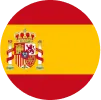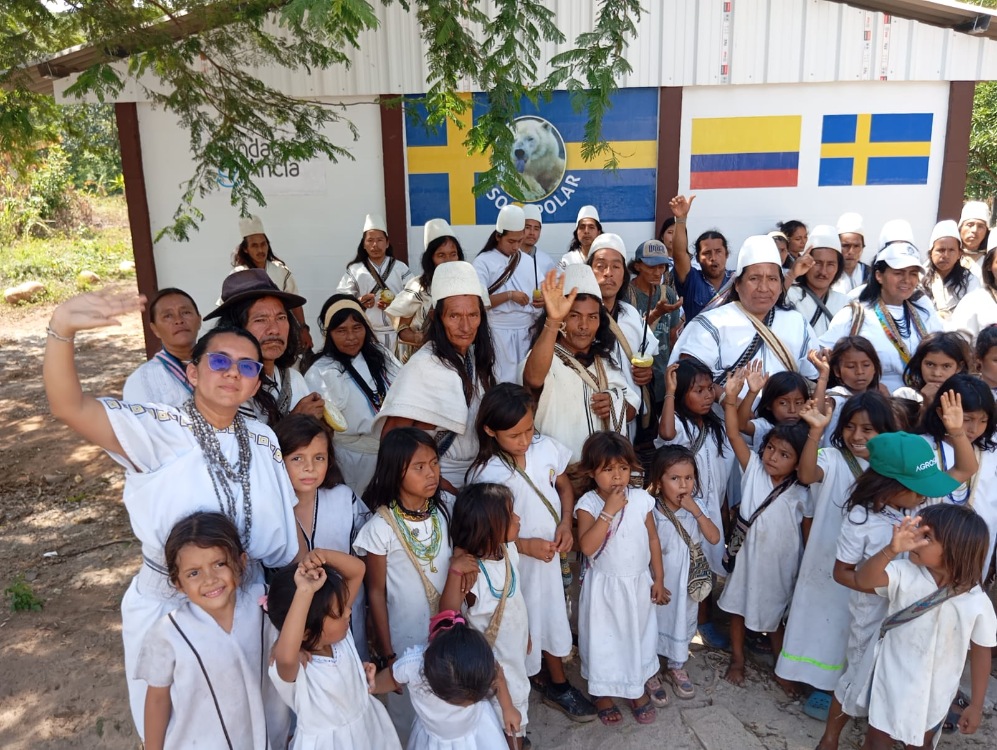Codazzi, Cesar. August 20, 2024. The Motilonia Research Center, working with the Ikarwa, Umuriwa, and Sabana Crespo Arhuaco communities, delivered printed copies in the Arhuaco language of the booklet entitled "Azi kinki kawi wazwenno kunsamu nunaba ta ichu Ziti jwasi zweykwa nundi Iku'se nunaba ta," which will be used as a teaching document for basic education and high school in these communities thanks to the AGRILAC Resiliente Cesar initiative and the Obtaining bean varieties-KOLFACI project.
After a year and a half of work, the launch of the educational booklet on biofortified beans for the Arhuaco community was celebrated. This represents a significant achievement in collaboration with the Motilonia Research Center and community agents, such as ASOANEI. This educational material documents and celebrates the process of introduction, harmonization, acceptance, baptism, and dissemination of this bean variety within the community.
Notably, this initiative includes versions in multiple languages (Spanish, Portuguese, French, and English), as well as the original version in the Arhuaco language. This reflects a commitment not only to the preservation and respect of the indigenous language and culture but also to the dissemination of knowledge internationally.
In addition, the inclusion of this booklet in the Alianzas AGROSAVIA collection, which already has five similarly translated publications, shows a continuous effort to reduce the inequity in access to educational material in areas where internet connectivity is limited, ensuring that these communities have access to vital educational resources.
The researcher from the Motilonia Research Center, Adriana Tofiño, who led this initiative, said: "It has been a one-hundred percent collaborative process. It is important to highlight that we coordinated the physical delivery of the booklet in the Arhuaco language with the delivery of the new facilities of the Geygekun school in better conditions through Fundación Ancla. We articulated actors so that these young Arhuacos maintain all the guidelines as guardians of the heart of the world."
The booklet entitled "Azi kinki kawi wazwenno kunsamu nunaba ta ichu Ziti jwasi zweykwa nundi Iku'se nunaba ta" or " Biofortified bean Agrosavia Rojo 43" will be used as an educational text by the Arhuaco children. It is worth highlighting that the booklet was articulated to the Jóvenes Rurales program [Rural Youth program], with which AGROSAVIA also works.
Aurora Izquierdo, founder of ASOANEI, stated: "Arhuaco women are called to cool the planet." This premise will be achieved by disseminating the Arhuaco thought throughout the planet. The Arhuaco people live in the Sierra Nevada de Santa Marta and call themselves guardians of the heart of the world because they protect the harmony between the spiritual and material worlds thanks to the enormous respect they have for nature in all its forms, animated and inanimated, because for them, all have spiritual parents, including rivers, rocks, trees.
Following the above, they maintain a balance between production and conservation in all their life practices. This thought becomes increasingly important in the global environmental devastation scenario. In this order of ideas, the bean is a material and immaterial value species for the Arhuaco people, representing women, and becomes the articulator of all the thoughts of this ancestral people that are now materialized in a booklet. This document describes the process by which this ethnic group harmonizes, accepts and names the seeds of the biofortified bean Agrosavia rojo 43 and makes it part of its heritage to survive harmoniously in the Sierra Nevada to complement the native species on which its diet is based.
This document was developed collaboratively with ethnic Arhuaco teachers and was published online in the five languages mentioned (Arhuaco, Spanish, Portuguese, French, and English) to promote the Arhuakization of the planet. According to Román Torres, an ethnic teacher at the Geygekun school, this text will facilitate the learning of the language by the "IKU" or Arhuaco children. "Children must have all the necessary tools to be able to absorb knowledge, both ancestral and technical. It is our task to help this happen to maintain our traditions and integrate them with new knowledge," added Román.
The delivery of the printed booklets was accompanied by a kit of seeds for biofortified crops such as maize (V160), beans (Agrosavia rojo 43), sweet potato (Aurora), and cassava for the Kwagueka, Geygekun, Umuriwa, and Gunwarum schools. After the delivery, a field day was held to promote elite beans that are tolerant to climate change, selected participatively within the framework of the project Obtaining bean varieties KOLFACI, and the biodiverse plots of the basket of biofortified crops of Agrilac Resiliente Cesar. This event was attended by the Arhuaco cabildo governor Zarwawiko Torres, who had the opportunity to share the happiness of the children of Ikarwa when they received their new school on the same day thanks to Fundacion ANCLA, the booklets in Arhuaco and the seeds of biofortified crops such as beans, cassava and sweet potato from AGROSAVIA. The booklets are published online in the AGROSAVIA repository at the following links:
- Description of the ancestral processes for the recognition by the Arhuaco people of the biofortified beans Agrosavia Rojo 43. https://editorial.agrosavia.co/index.php/publicaciones/catalog/book/395
- Descrição dos processos ancestrais para o reconhecimento pelo povo Arhuaco do feijão biofortificado Agrosavia Rojo 43: Azi kinki kawi wazwenno kunsamu nunaba ta ichu Ziti jwasi zweykwa nundi Iku’se nunaba ta. https://editorial.agrosavia.co/index.php/publicaciones/catalog/book/390.
- Description des processus ancestraux pour la reconnaissance de haricot biofortifié Agrosavia Rojo 43 par le peuple Arhuaco: Azi kinki kawi wazwenno kunsamu nunaba ta ichu Ziti jwasi zweykwa nundi Iku’se nunaba ta. https://editorial.agrosavia.co/index.php/publicaciones/catalog/book/389
- Azi kinki kawi wazwenno kunsamu nunaba ta ichu Ziti jwasi zweykwa nundi Iku’se nunaba ta. https://editorial.agrosavia.co/index.php/publicaciones/catalog/book/381
- Descripción de los procesos ancestrales para el reconocimiento por el pueblo Arhuaco del fríjol biofortificado AGROSAVIA Rojo 43: Azi kinki kawi wazwenno kunsamu nunaba ta ichu Ziti jwasi zweykwa nundi Iku’se nunaba ta. https://editorial.agrosavia.co/index.php/publicaciones/catalog/book/380.
- More information here:
- Rodrigo Tofiño Rivera
- Communications, Identity and Corporate Relations Professional
- Research Center Nataima
- Communications, Identity and Corporate Relations Advisory Office
- rrofino@agrosavia.co
- AGROSAVIA





